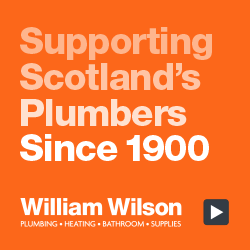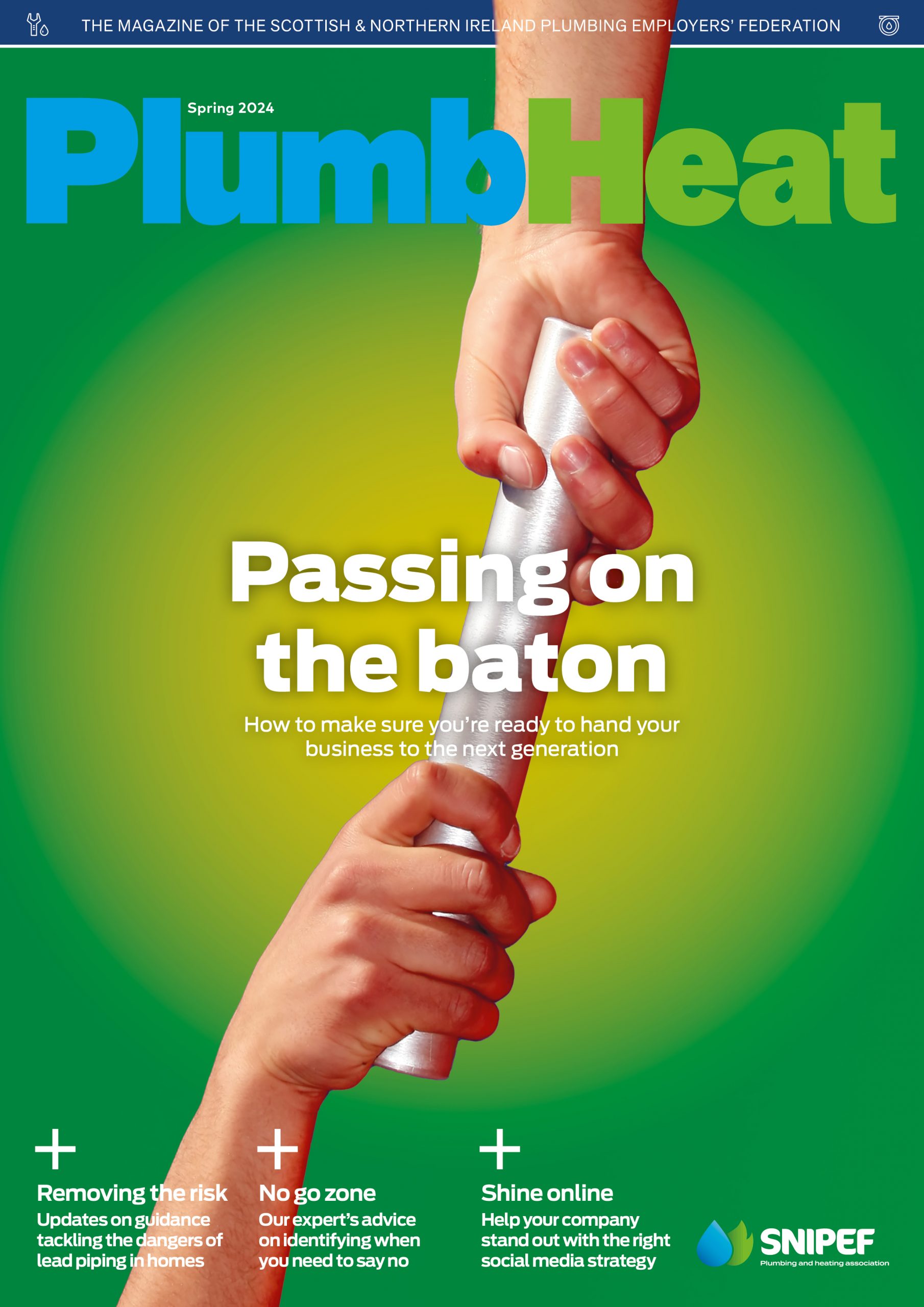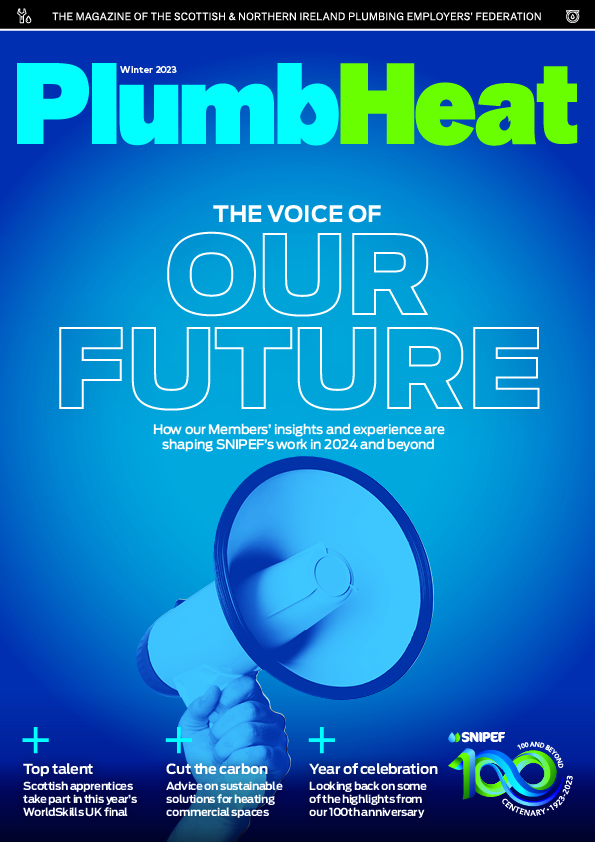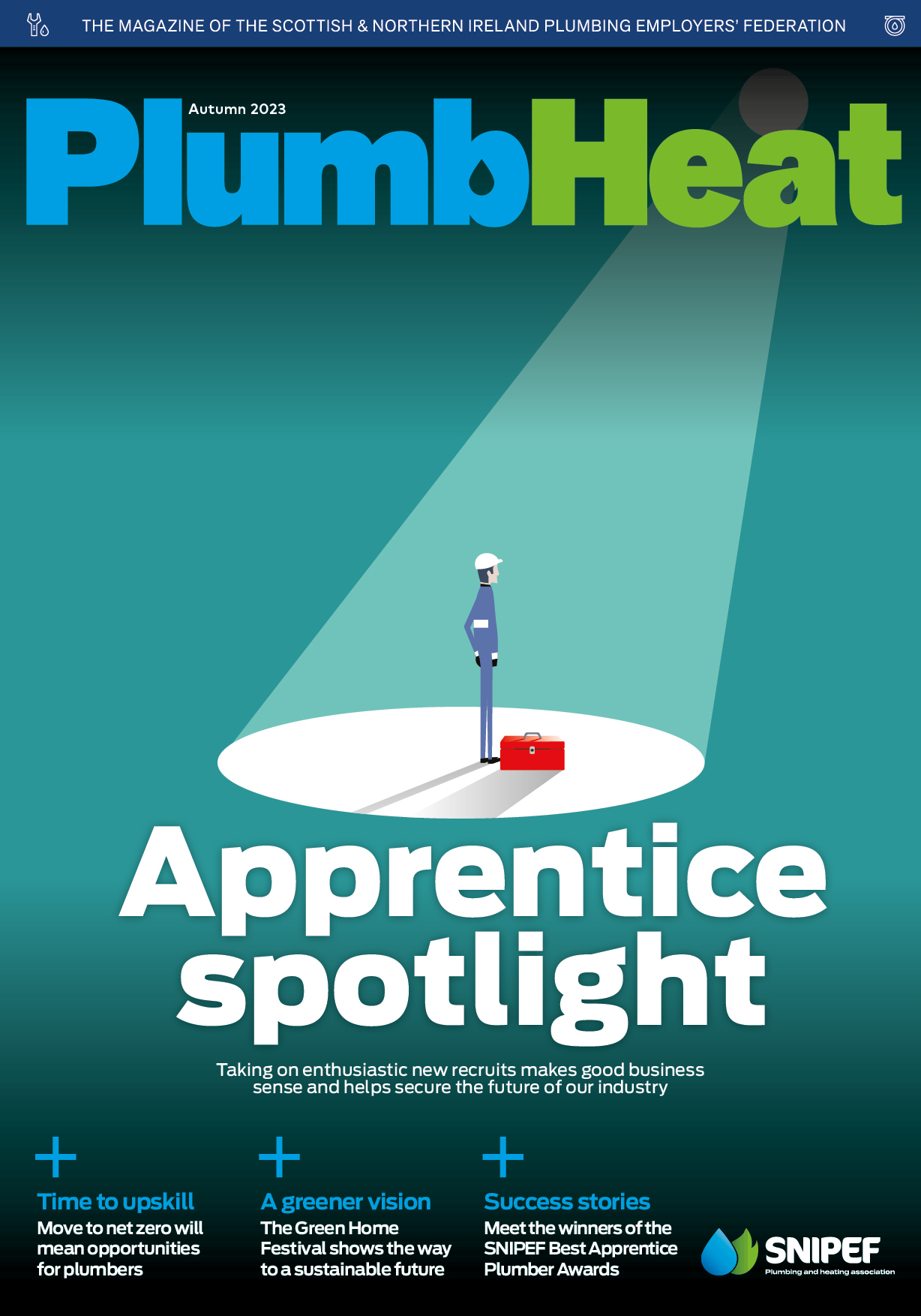General Election 2024
The Scottish and Northern Ireland Plumbing Employers’ Federation (SNIPEF) presents its solution-focused manifesto for the 2024 General Election, aimed at creating a greener, safer, more productive and prosperous UK.
Advocating transformative policies and higher standards, SNIPEF's manifesto takes a holistic approach to modern challenges. It envisions a future where environmental stewardship, public safety and economic growth are aligned. Through a commitment to skills development and innovative practices, SNIPEF charts a clear path toward a more sustainable and prosperous nation.
SNIPEF Manifesto in 60 seconds
SNIPEF's five calls to action
One: Renew, Not Replace: Building a more sustainable future
Our Ask: SNIPEF calls for a priority-led and funded National Building Retrofit Plan to upgrade the nation’s ageing housing stock and enhance its resilience to climate change. This initiative would improve energy efficiency, reduce carbon emissions, stimulate economic growth, create green employment opportunities, and protect public health.
Benefits: Enhanced property values through energy-efficient upgrades, improved indoor air quality and comfort, revitalisation of communities by transforming and preserving ageing neighbourhoods, increased energy security through reduced dependence on non-renewable sources, and a substantial decrease in the UK's environmental footprint.
Our call to action: The government must prioritise retrofit planning and align all sustainability initiatives and funding to the Plan. This includes ensuring planning decisions support the Plan's objectives, enforcing stringent sustainability standards, and promoting specialised retrofit training.
Two: Ensure, Not Endanger: Elevating water safety standards
Our Ask: SNIPEF proposes creating a mandatory Water Safety & Conservation Registration Scheme to certify that individuals working with the nation’s water infrastructure possess the requisite skills, training and knowledge to comply with all water safety protocols and standards, thereby safeguarding public health and well-being and promoting water conservation.
Benefits: Enhanced public health protection against water-related hazards, greater public assurances on the competency of those working on this critical infrastructure, a greater focus on saving and not using water and help restore public confidence in the UK's potable and non-potable systems, with an added focus on conservation.
Our call to action: For government to partner and collaborate with the plumbing and heating profession to develop a regulatory framework and support systems for registering water professionals. This collaboration aims to enhance or expand existing mechanisms rather than create new systems to ensure that professionals possess the necessary training, skills, and expertise in water safety and conservation to protect public health effectively.
Three: Invest in Progress: Powering productivity with people
Our Ask: SNIPEF proposes a National SME Productivity Scheme to boost UK productivity by encouraging continuous professional development. The scheme would offer SMEs a 100-150% tax offset for investing in accredited training programmes that directly enhance productivity, thereby significantly investing in human capital and supporting national economic goals.
Benefits: Increased economic growth and competitiveness, improved SME efficiency and innovation, enhanced workforce skills and job satisfaction, and substantial contributions to closing the UK's productivity gap, which lags behind that of other developed nations.
Our call to action: Implement a tax incentive scheme to encourage SMEs to invest in accredited training programmes that boost productivity, fostering a cycle of growth, innovation, and competitiveness that aligns with our national economic aspirations.
Four: Fair Play on Pay: Reforming retentions in construction
Our Ask: SNIPEF calls for systematically reforming the construction sector's unfair and often abused retention practices. Reforming this punitive and outdated practice would help ensure timely payment to subcontractors and suppliers, improve quality, foster a healthier economic environment and promote fairness across the sector.
Benefits: Reforming retention practices would stabilise subcontractor cash flows, enhance transparency and trust across the construction sector, and promote economic resilience. These changes will ensure timely payments, fostering a fair and ethical business environment that supports sustained economic growth and stability in the sector.
Our call to action: The government must legislate reforms to retention practices, as voluntary measures have proven inadequate. By enforcing transparent, prompt, and fair payment processes, these reforms will protect subcontractors, securing the financial health of businesses within the construction sector and contributing to broader economic stability and growth. This legislative action is crucial for fostering a reliable and ethical business environment.
Five: Targeting a Sustainable Future: Realistic goals, achieveable outcomes
Our Ask: SNIPEF advocates reviewing and reassessing short-and medium-term low-carbon transition targets without diminishing the end goals. This initiative ensures these targets reflect achievable, practical, and economically viable goals to facilitate an effective and sustainable transition to green technology.
Benefits: Stabilising market conditions, enhancing public trust and ensuring economic growth, encouraging investments in green technologies, fostering public support for sustainable practices, and maintaining economic stability through predictable and viable business planning. These adjustments will promote a fair and progressive transition to a low-carbon future, securing environmental and economic health for future generations.
Our call to action: The government must reassess low carbon transition targets to ensure they are practical and achievable, consulting with industry and the public to ensure the goals align with the latest technological and economic insights. Additionally, the government must better support businesses adopting green technologies by providing targeted incentives and comprehensive training programs. These steps are vital for upholding the UK's leadership in sustainable development and securing long-term prosperity and environmental well-being.
Find your Prospective Parliamentary Candidate
Engaging with your Prospective Parliamentary Candidate
You will undoubtedly encounter some of your local Prospective Parliamentary Candidates (PPCs) either on the street or at your doorstep between now and 4 July.
As a plumbing and heating professional and business owner, it's essential to engage with these PPCs to understand how they plan to support your business and the profession at large. To help, we have compiled a list of straightforward questions based on our manifesto that you can ask them.
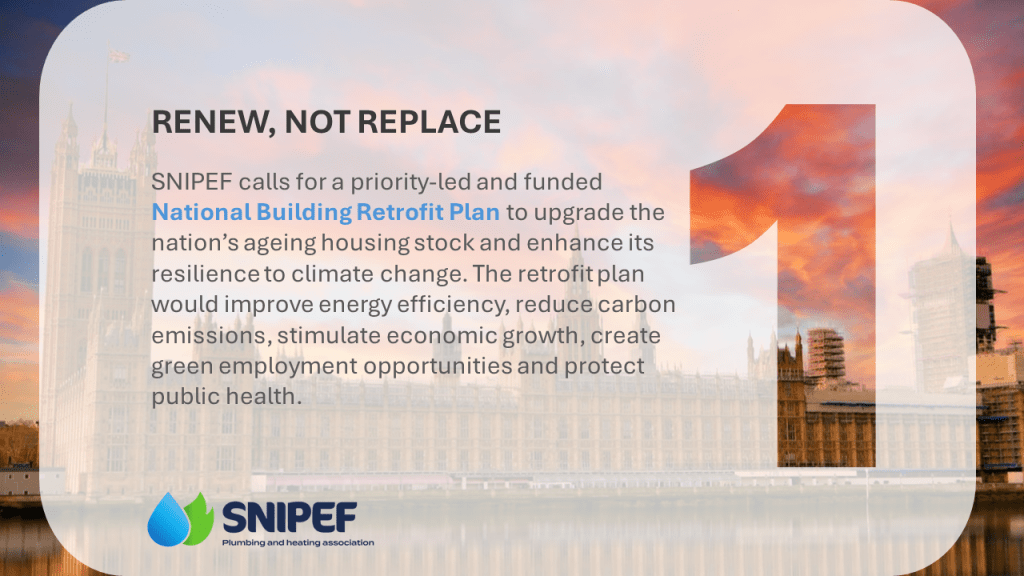
Question: "What are your party's plan to address the UK housing crisis by retrofitting existing homes instead of just building new ones?"
Answer: "Retrofitting upgrades existing homes, saving resources and reducing waste compared to new builds. It's faster, costs less, and helps preserve historical buildings and rejuvenate neighbourhoods, making it a practical, sustainable choice for improving housing."
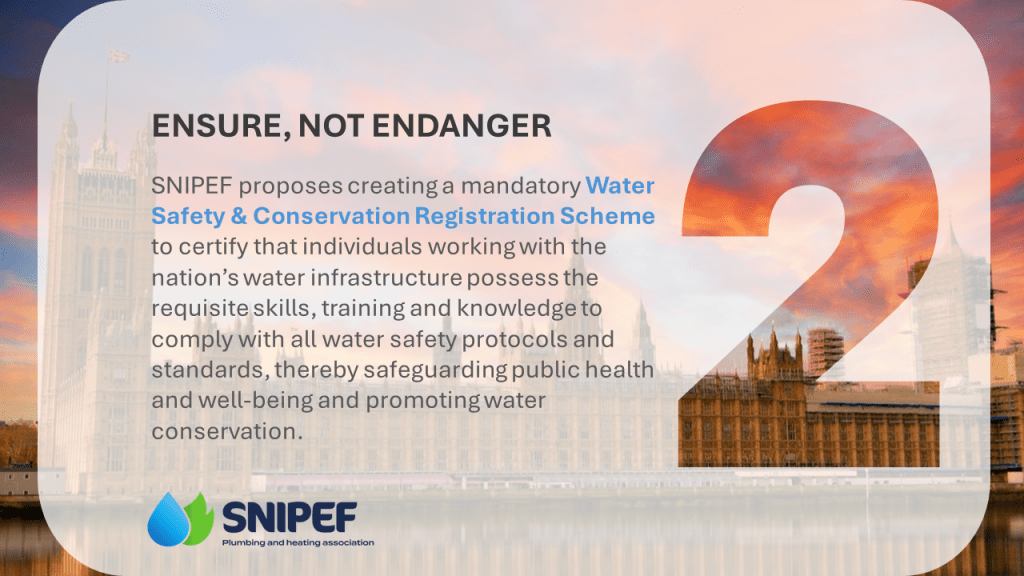
Question: "With recent water industry scandals, how will your party ensure proper training and certification for those handling water infrastructure?"
Answer: "We advocate for stringent training and certification for water infrastructure workers, similar to standards for gas engineers. This ensures they are skilled in maintaining safety and conservation, crucial given recent industry issues."

Question: "Would you support a tax offset of 100-150% to encourage SMEs to train and upskill their employees, boosting UK productivity?"
Answer: "A high tax offset would change the UKs outdated corporate mindset towards the value of training and upskilling. This incentive would encourage businesses to invest in their employees, enhancing productivity and making the UK more competitive globally."
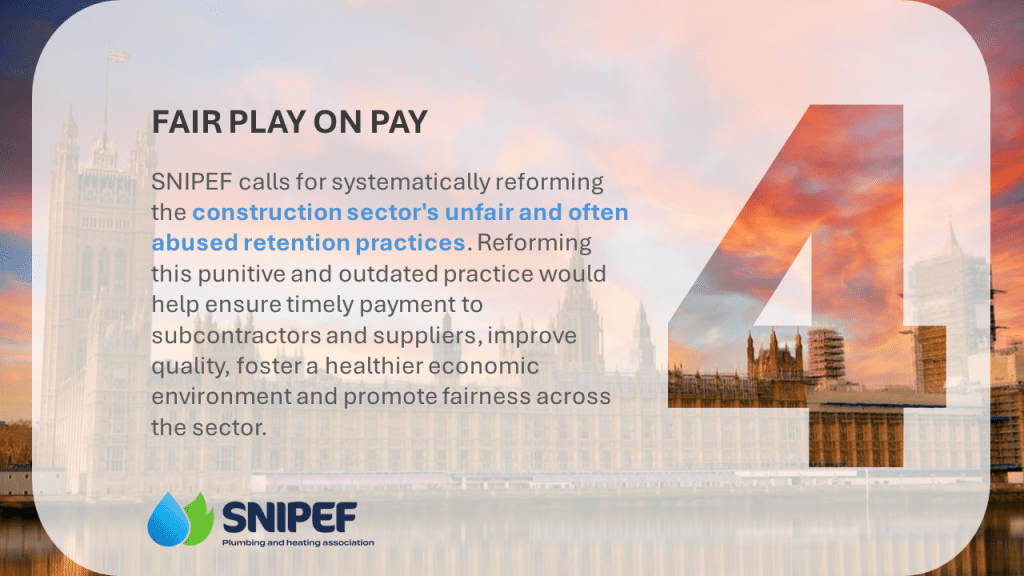
Question: "How will your party address the issues of unfair payment practices in the construction sector to ensure timely and fair compensation for subcontractors?"
Answer: "Amend the law to set strict rules to ensure that all payments and the return of retentions are made promptly and transparently. It would help protect subcontractors and suppliers from delays and unfair practices, ensuring everyone gets paid on time and in full."
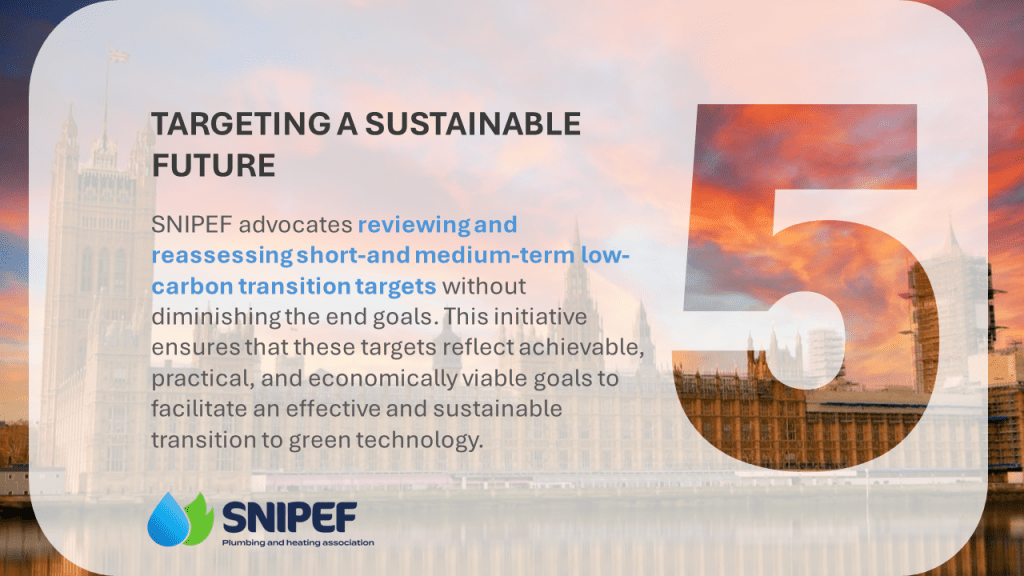
Question: "With recent reductions in low carbon targets, how will you ensure that future goals are realistic and achievable?"
Answer: "We believe targets must be practical and involve industry input to ensure they're achievable. Addressing workforce shortages and setting realistic goals are essential to maintain confidence and encourage investment in low carbon technologies."
Have a question or need our help?
In the media
